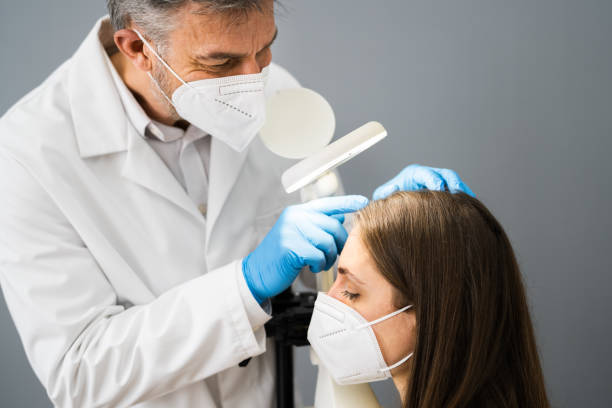How can a Dermatologist help with hair loss?
Hair loss is a common concern affecting millions of people worldwide, regardless of age or gender. While some hair shedding is normal, excessive hair loss can lead to thinning, bald patches, and reduced confidence. Consulting a Best Dermatologist in Dubai can provide expert guidance on diagnosing and treating hair loss effectively. Dermatologists specialize in skin, hair, and scalp health, making them the ideal professionals to address hair-related issues.Hair loss can stem from various factors, including genetics, hormonal imbalances, nutritional deficiencies, stress, and underlying medical conditions. A dermatologist conducts a thorough evaluation to determine the root cause and recommends personalized treatments to promote hair regrowth and prevent further loss.
How Dermatologists Diagnose Hair Loss?
Before recommending treatments, dermatologists perform a detailed assessment to identify the type and cause of hair loss. The diagnostic process may include:
Medical History Review – Discussing family history, diet, lifestyle, and any recent illnesses or medications.
Physical Examination – Inspecting the scalp for signs of inflammation, infection, or scarring.
Pull Test – Gently tugging on hair strands to assess shedding.
Scalp Biopsy – Taking a small scalp sample for lab analysis (in rare cases).
Blood Tests – Checking for deficiencies (iron, vitamin D, thyroid hormones) or hormonal imbalances.
Common Types of Hair Loss Diagnosed by Dermatologists
| Type of Hair Loss | Characteristics | Possible Causes |
|---|---|---|
| Androgenetic Alopecia | Gradual thinning, receding hairline (men), widening part (women) | Genetics, hormonal changes |
| Alopecia Areata | Sudden patchy hair loss | Autoimmune disorder |
| Telogen Effluvium | Excessive shedding after stress, illness, or childbirth | Stress, nutritional deficiencies, surgery |
| Traction Alopecia | Hair loss due to tight hairstyles (ponytails, braids) | Constant pulling on hair follicles |
| Scarring Alopecia | Permanent hair loss due to damaged follicles (from burns, infections, or diseases) | Infections, inflammatory conditions |
How Dermatologists Treat Hair Loss?
Once the cause is identified, dermatologists recommend tailored treatments to restore hair health. Some common approaches include:
Medications
Minoxidil (Rogaine) – A topical solution that stimulates hair growth.
Finasteride (Propecia) – An oral medication for male pattern baldness (blocks DHT hormone).
Corticosteroids – Injections or creams for alopecia areata to reduce inflammation.
Platelet-Rich Plasma (PRP) Therapy
PRP involves injecting the patient’s own platelet-rich plasma into the scalp to stimulate hair follicles and encourage regrowth.
Low-Level Laser Therapy (LLLT)
A non-invasive treatment using laser light to boost hair follicle activity and improve thickness.
Nutritional Guidance
Dermatologists may recommend supplements (biotin, iron, zinc) or dietary changes to address deficiencies contributing to hair loss.
Hair Transplant Surgery
For advanced hair loss, dermatologists may suggest surgical options like Follicular Unit Extraction (FUE) or Follicular Unit Transplantation (FUT).
Lifestyle & Hair Care Recommendations
Avoiding harsh chemicals and heat styling.
Using gentle shampoos and conditioners.
Managing stress through relaxation techniques.
When to See a Dermatologist for Hair Loss?
You should consult a dermatologist if you notice:
✔ Sudden or excessive hair shedding.
✔ Bald patches or widening part.
✔ Scalp itching, redness, or flaking.
✔ Hair thinning despite home remedies.
FAQ’s:
Can a dermatologist really help with hair loss?
Yes! Dermatologists specialize in hair and scalp conditions. They diagnose the root cause and provide medical treatments that over-the-counter products cannot offer.
How long does it take to see results from hair loss treatments?
Results vary depending on the treatment. Minoxidil may take 3-6 months, while PRP therapy may show improvement after a few sessions. Consistency is key.
Is hair loss always permanent?
No. Conditions like telogen effluvium or nutritional deficiencies are often reversible with proper treatment. However, genetic hair loss (androgenetic alopecia) requires ongoing management.
Are hair loss treatments painful?
Most treatments (topical applications, PRP, laser therapy) are minimally uncomfortable. Hair transplants involve local anesthesia to minimize pain.
Can stress cause hair loss?
Yes. Stress triggers telogen effluvium, where hair prematurely enters the shedding phase. Managing stress can help restore hair growth.
Do shampoos really help with hair loss?
Some medicated shampoos (containing ketoconazole) may help, but they are not standalone solutions. Dermatologists prescribe stronger treatments for significant hair loss.
Can diet affect hair loss?
Absolutely! Lack of protein, iron, or vitamins can lead to hair thinning. A dermatologist may recommend supplements or dietary adjustments.
Conclusion
Hair loss can be distressing, but a dermatologist offers expert solutions to combat it effectively. From diagnosing the underlying cause to recommending advanced treatments like PRP, medications, or laser therapy, dermatologists play a crucial role in restoring hair health. If you’re experiencing persistent hair loss, consulting a Best Dermatologist can provide personalized care and long-term solutions tailored to your needs.By understanding the causes and seeking professional help early, you can take proactive steps toward healthier, fuller hair. Don’t let hair loss affect your confidence—schedule a consultation and explore the best treatment options available!
